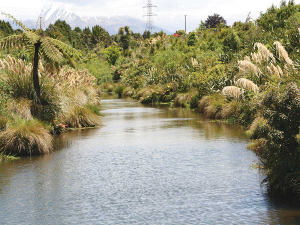Editorial: Happy days
OPINION: The year has started positively for New Zealand dairy farmers and things are likely to get better.
 Farmers will soon have an app to help them make better decisions about how to control erosion and reduce sediment entering waterways.
Farmers will soon have an app to help them make better decisions about how to control erosion and reduce sediment entering waterways.
Farmers will soon have an app to help them make better decisions about controlling erosion and reducing sediment entering New Zealand waterways.
This follows a four-year project supported by the Ministry for Primary Industries’ (MPI’s) Sustainable Farming Fund (now superseded by Sustainable Food & Fibre Futures). Developed via the ‘Don’t Muddy the Water’ project, led by Agrilink and NIWA, the app measures the impact of various practices for reducing sediment and phosphorus loss.
The app user is required to enter factors such as soil type, slope and location. Mitigations, such as vegetated buffer strips and sediment retention ponds, can then be added to assess the impact of these practices.
“The project came out of the need to put some numbers behind the performance of typical sediment control measures,” says Andrew Barber, managing director, Agrilink.
The project ran trials of different good management practices to test how best to keep soil in the paddock and out of waterways. This included measures such as cover crops, sediment retention ponds, vegetated buffer strips and wheel track dyking/ripping.
It found that 96% of large soil particles would be stopped by almost any sized pond. However, a minimum pond size of 50m3/ha was required to capture more than 80% of light suspended soil. These findings, along with work on vegetated buffer strips, were added to the app.
“Demonstrating the key control measures and collecting the data that can be used in our tool to calculate their effectiveness, has enabled a more cohesive approach nationally to soil management,” says Barber.
“It allows farmers to do a paddock risk assessment and subsequently prioritise their actions as part of their future Farm Environment Plans. The app also allows them to provide robust evidence to support consents or prove to regional authorities that their control measures are effective.”
Agrilink has been hosting workshops around the country to inform farmers about their findings.
Barber says the ‘Don’t Muddy the Water’ app is a tool to help decision-making. “Ultimately, this is a win-win for farmers and the environment.”
Steve Penno, director investment programmes at MPI, says the app is a practical tool that will help farmers take action to reduce their environmental footprint.
“This project has provided quality information on how erosion and sediment loss can be effectively mitigated, and the app makes this information available to farmers in a practical and useful way.”
The ‘Don’t Muddy the Water’ app will be free and is expected to be publicly available from February 2020.
Additional reductions to costs for forest owners in the Emissions Trading Scheme Registry (ETS) have been announced by the Government.
Animal welfare is of paramount importance to New Zealand's dairy industry, with consumers increasingly interested in how food is produced, not just the quality of the final product.
Agriculture and Forestry Minister Todd McClay is encouraging farmers and growers to stay up to date with weather warnings and seek support should they need it.
The closure of SH2 Waioweka Gorge could result in significant delays and additional costs for freight customers around the Upper North Island, says Transporting New Zealand.
OPINION: The year has started positively for New Zealand dairy farmers and things are likely to get better.
Ministry for Primary Industries (MPI) Director General Ray Smith believes there is potential for an increase in dairy farming in New Zealand.

OPINION: If the hand-wringing, cravat and bow-tie wearing commentariat of a left-leaning persuasion had any influence on global markets, we'd…
OPINION: With Winston Peters playing politics with the PM's Indian FTA, all eyes will be on Labour who have the…